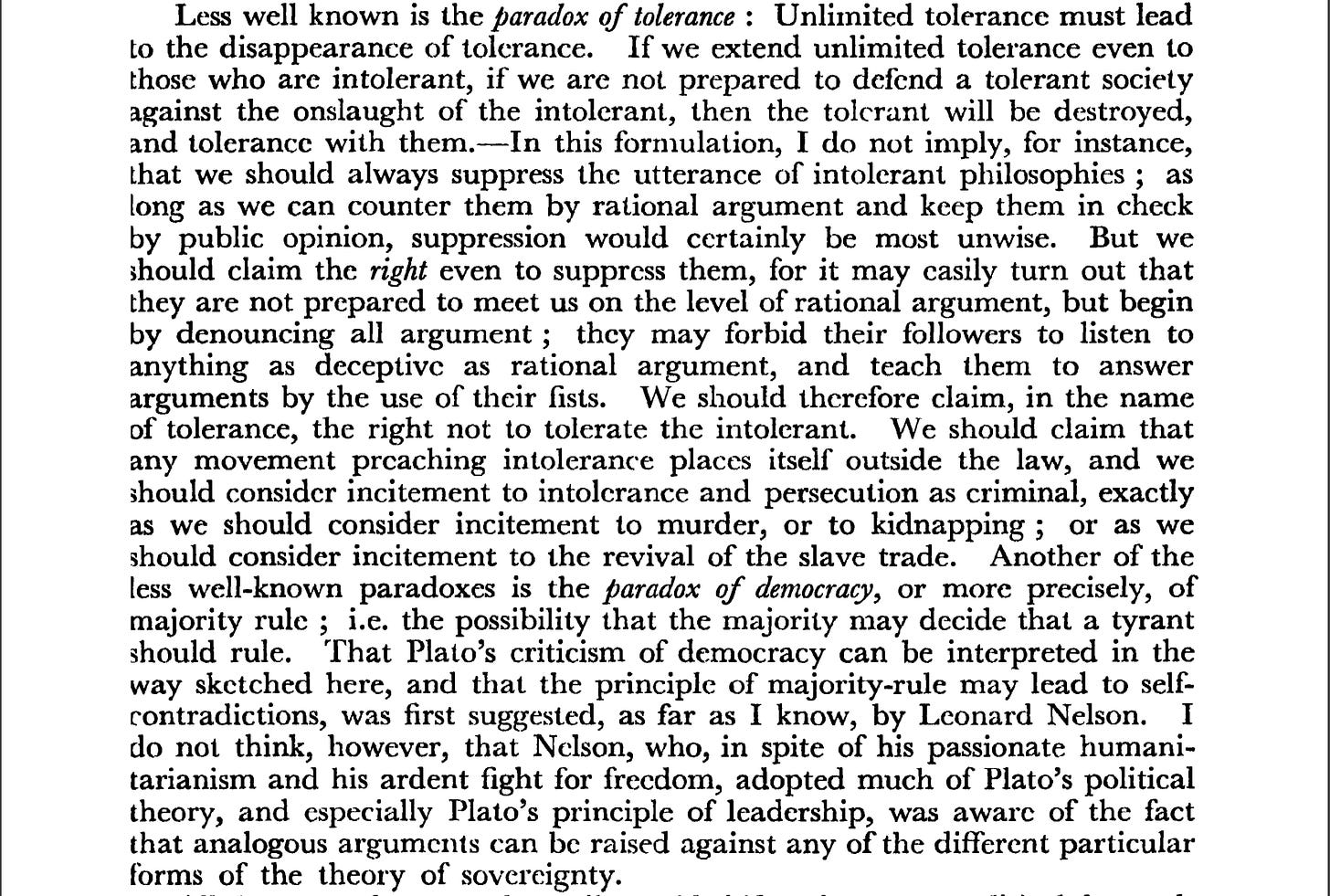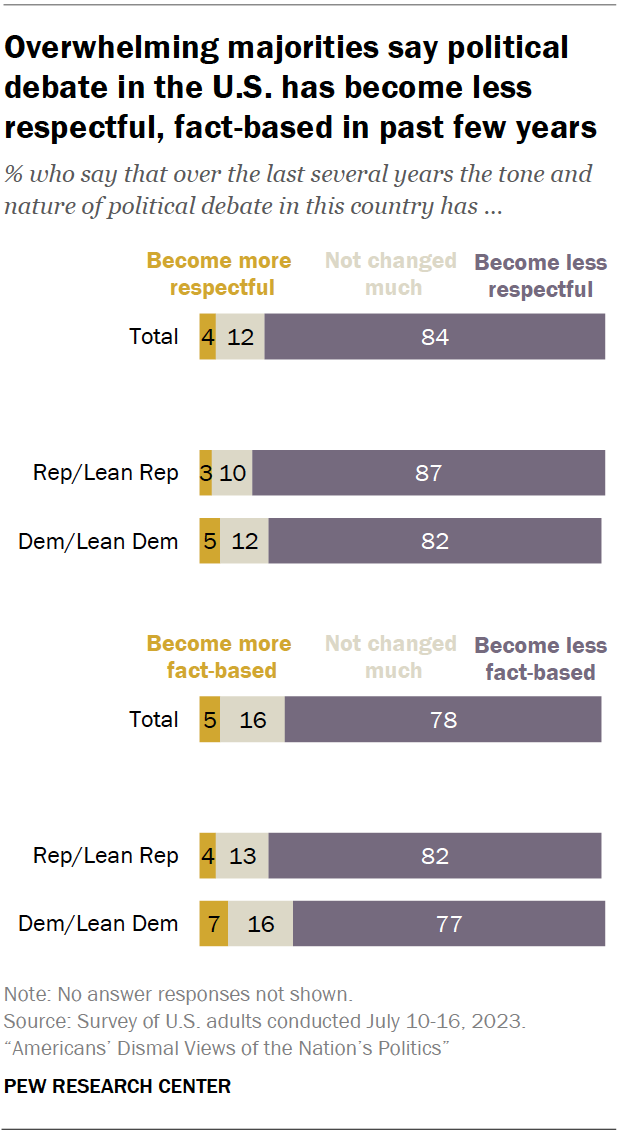“We should, therefore claim, in the name of tolerance, the right not to tolerate the intolerant.”
-Karl Popper
The resurgence of intolerant, interconnected ideologies—Christian Nationalism, white supremacy, racism, misogyny, xenophobia, and transphobia—poses pressing ethical and social questions that scare the poop out of me.
In the US, the FBI is investigating mass texts sent to Black Americans after the election telling them they were “selected to pick cotton at the nearest plantation.” Social media flooded with misogynistic cries for “your body, my choice,” “repeal the 19th” (women’s right to vote), and “get back to the kitchen.” The entire election cycle felt aimed at priming Americans to hate trans people.
This intolerance is not limited to the US. Femicide - the murder of women and girls - remains a common global form of gender-based violence. Earlier this year, United Nations experts feared the alarming global rise in Islamophobia. Genocide is the end-stage result of intolerance and dehumanization. And yet many nations - including the US - continue to tolerate the ongoing genocide in Gaza. In response, antisemitism continues to increase dramatically in Belgium and France. A few days ago, with witnesses noting flagrant anti-Arab and anti-Semitic activities combined with rowdy football hooliganism, Israeli soccer fans were attacked in Amsterdam, leading to numerous injuries and arrests. The city has temporarily banned protests while order is restored.
Intolerance is so tolerated - and can explode so quickly - that entire populations are unsafe.
How do we respond to views and policies that endanger others?
In a hospital, it’s my job to take care of whoever shows up. I regularly meet all sorts of people and get to learn about what they care about, often while they face a significant health issue. It’s one of the things I love about being a physician - no matter my personal experiences, my bubble can’t ever get that small.
As a physician and ethicist, I’m concerned with regressive policies restricting access to reproductive health care, gender-affirming care, and issues impacting children, as well as broader issues related to human rights and human dignity. I worry about these because I see up close how these policies can impact the patients I care for.
I’m also concerned about our societal struggle to engage in even minor disagreements. In a pluralistic society, we can benefit from diversity, but only if we can find a balance in maximizing tolerance for culture and ideas without sacrificing the dignity of some in favor of others.
Philosopher Karl Popper's "Paradox of Tolerance" offers a powerful framework to explore the tension in these challenges.

The Paradox of Tolerance
Renowned philosopher Karl Popper introduced the Paradox of Tolerance in his 1945 book, The Open Society and Its Enemies. He argued that a society infinitely tolerant of all ideas, including intolerant ones, would eventually see tolerance destroyed. If we allow harmful ideologies to flourish unchecked, they inevitably suppress the rights of others, undermining the open, diverse society that tolerance aims to protect.
Popper would know. Born in Austria of Jewish descent, he left his home in Austria in 1934 under the rise of Nazi antisemitism. He wrote The Open Society and Its Enemies after re-settling in New Zealand - considering it his contribution to the war.
Popper specifically tells us to use rational argument, rather than idea suppression, as a way to combat intolerance: “I do not imply, for instance, that we should always suppress the utterance of intolerant philosophies; as long as we can counter them by rational argument and keep them in check by public opinion, suppression would certainly be most unwise.”

Tolerance does not mean a lack of disagreement or criticism. Popper contended that pluralistic societies must recognize a boundary: tolerance should not extend to ideologies that fundamentally oppose the principles of equality and freedom. Popper focuses - not on happiness - but on the moral urgency of pain and suffering. In the paradox, he also argues that we shouldn’t shut down discourse or silence those we disagree with, but engage in discussion more deeply. Free speech is the very tool we need to avoid authoritarianism.
A tolerant society, paradoxically, must defend itself by using rational arguments and public opinion to diminish viewpoints that seek to dismantle the rights and safety of others.
“Anything as deceptive as rational argument”
This idea is really annoying in a society seemingly incapable of rationally debating even minor disagreements, let alone openly discussing our deepest-held values, rights, and human dignity. A Pew Research study in 2023 found that an overwhelming majority of Americans across ideologies say the political debate has become less respectful and less based on factual evidence. This echoed a 2018 study, where Pew found that 8 out of 10 respondents felt Republicans and Democrats couldn’t agree on basic facts. It certainly feels that way.
Suzanne Nossel writes, “the perception that one cannot speak freely-coupled with the fear of reprisal or exasperation that our discourse makes it impossible to be heard - is feeding corrosive levels of social and political frustration.”
Good reasoning requires good facts. Popper tells us that “it may easily turn out that they are not prepared to meet us on the level of rational argument, but begin by denouncing all argument; they may forbid their followers to listen to anything as deceptive as rational argument, and teach them to answer arguments by the use of their fists.”
Underlying this is an assumption that I not only have a rational argument but can articulate it - even in situations where the divide feels cataclysmic.
We are all exhausted after umpteen years of wars, economic crises, mis/disinformation campaigns, and a global pandemic. It takes a lot of work to check not only our own biases and evidence but also stumble through the primary source material of those on the other side of any idea and articulate it all without losing our cool.
I’ve also been the person on the other side of Popper’s scenario - so mired in my own conclusion that I don’t analyze an issue deeply enough and only realize later that my view wasn’t as informed or rational as I initially believed. I’ve been the one who denounced all argument. I really hate that feeling.
Why is This Relevant Today?
We’re witnessing a concerning surge in fringe ideologies that seek to deny basic rights, safety, and participatory power to certain groups - women, trans people, Black people, immigrants, etc. Policy shifts targeting access to healthcare, transgender rights, and reproductive freedom signal more than political disagreements—they pose existential threats to certain groups' rights and safety. When certain ideologies seek to erase the dignity and freedoms of a subset of people, tolerating these beliefs contradicts the very foundation of a just society.
Acknowledging the necessary tension of tolerance allows us to think more critically about who and what we aim to defend.
Limits and Loss of Healthcare Access: When political or ideological movements aim to strip people of access to critical healthcare (including abortion and gender-affirming care), they’re challenging not only individuals' freedoms but their health and very survival. The Supreme Court’s decision in Dobbs stripped away a fundamental right to abortion but didn’t rely on accurate history or evidence-based arguments but rather partisan narratives. The loss of abortion access harms poor women the most, so the system leads those with the fewest resources to be worse off.
Discrimination against Trans People: Trans people continue to suffer immensely from discrimination, but rather than reducing discrimination, there’s a push to prevent access to care and erase trans people. As a physician, it is incredibly frustrating when we cannot have a rational discussion about the risks, benefits, and alternatives to care centering trans patients’ experiences and scientific evidence.
Rise in Hate Speech (incitement to discrimination, hostility, and violence): With increased visibility on social media, bigoted perspectives amplify intolerance, often inciting harmful actions both on- and offline toward marginalized groups. The open rise of Christian Nationalism and white supremacy are particularly concerning in a pluralistic society. A failure to restrict hate speech implicitly endorses groups aiming to harm others and allows the perpetuation of that harm.
Applying the Paradox of Tolerance
Understanding this paradox empowers us to advocate for necessary limits on tolerance. The key is rational argument. So how can one be prepared to make a rational argument about tolerance and intolerance?
Here are some ways we might explore the paradox in practice:
Protect Free Speech/Expression: In order to engage in the paradox of tolerance, we need to be able to freely speak, access literature, education, and accurate news. Burning books and only reading propaganda isn’t helping us become a more tolerant society.
Self-Education: Deepen your education on the issues you care about. Rather than solely relying on media outlets, get curious and look for primary source material. Challenge your skepticism and dig deeper into issues. Resist the urge to rub your new found knowledge in someone else’s face. (I know this is hard for some of us)
Support Boundaries in Public Policy: Free speech protections are essential for democracy, but we must not confuse free speech with limitless speech at the expense of others’ safety. We must advocate for and support policies that prevent hate speech and actions promoting discrimination and harm. This doesn’t mean dissenting views should be silenced — this must be limited to those that incite or promote harm. The Rabat Plan of Action sets a high threshold for restricting freedom of expression.
Engage in Disagreement: Conversations about tolerance and intolerance are essential. You don’t need to jump across party lines to practice minor disagreement skills. What is really being argued for or against? How can you be curious before being angry? Do you have access to good evidence? Are you jumping to a particular conclusion?
Educate: Educate ourselves and others on how unchecked intolerance endangers our fellow humans. Who benefits from intolerance? Whose wellbeing and safety is being sacrificed? What language is used to dehumanize some and elevate others?
Hold Leaders Accountable: Demand that leaders and institutions uphold these limits. Leaders should foster environments that support constructive discourse but refuse to accommodate actions or rhetoric threatening individuals’ rights and safety.
Do Not Comply in Advance: Popper tells us “The authoritarian will select in general those who obey, who believe, who respond to his influence. But in doing so, he selects mediocrities. For he excludes those who revolt, who doubt, who dare to resist his influence. Never can an authority admit that the intellectually courageous, i.e. those who dare to defy his authority, may be the most valuable type.” (The Open Society, p 118). When policies and political leaders push for intolerance, do not freely give them more power through easy compliance. This risks allowing for more intolerance and harm. With health care, we need physicians to do absolutely everything in our legal power to protect patients, and use our social power to advocate for legal access to patient care.
Karl Popper’s paradox reminds us that tolerance has a purpose: it acknowledges the tension inherent in a pluralistic society and aims to safeguard a society where everyone’s rights and safety are ensured. Protecting this purpose sometimes requires us to reject ideologies when those ideologies promote harm. Any time we consider limiting our tolerance, we risk becoming intolerant ourselves.
Awareness of this tension helps us navigate with nuance rather than falling into absolutism (or authoritarianism).
Resources
Popper, Karl, The Open Society and Its Enemies: The Spell of Plato. 1945.
Forst, Rainer, "Toleration." The Stanford Encyclopedia of Philosophy (Fall 2017 Edition), Edward N. Zalta (ed.).
Academy 4SC: To Tolerate or Not to Tolerate? https://academy4sc.org/video/paradox-of-tolerance-to-tolerate-or-not-to-tolerate/
Americans’ Dismal Views of the Nation’s Politics, Pew Research Center. September 2023.
Laloggia. Republicans and Democrats agree: They can’t agree on basic facts. Pew Research Center. August 2018.
Hasell, A., & Halversen, A. (2024). Feeling Misinformed? The Role of Perceived Difficulty in Evaluating Information Online in News Avoidance and News Fatigue. Journalism Studies, 25(12), 1441–1459. https://doi.org/10.1080/1461670X.2024.2345676
Suzanne Nossel; The Fate of American Democracy Depends on Free Speech. Daedalus 2024; 153 (3): 119–134. doi: https://doi.org/10.1162/daed_a_02093
Howard, Jeffrey W., "Freedom of Speech." The Stanford Encyclopedia of Philosophy (Spring 2024 Edition), Edward N. Zalta & Uri Nodelman (eds.).





